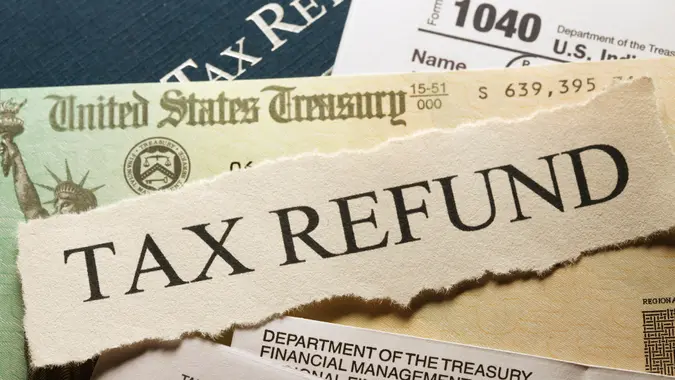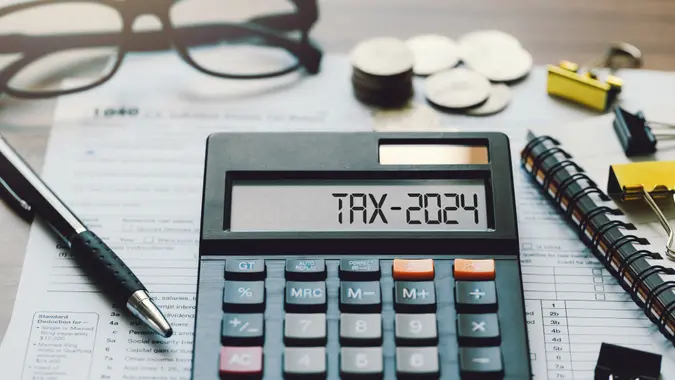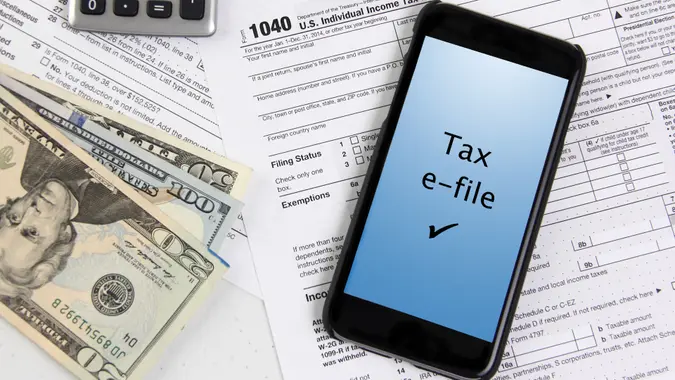I’m a Tax Expert: 8 Mistakes Filers Often Make When Using Tax Software

Commitment to Our Readers
GOBankingRates' editorial team is committed to bringing you unbiased reviews and information. We use data-driven methodologies to evaluate financial products and services - our reviews and ratings are not influenced by advertisers. You can read more about our editorial guidelines and our products and services review methodology.

20 Years
Helping You Live Richer

Reviewed
by Experts

Trusted by
Millions of Readers
A recent survey found that around 44% of people plan to use some type of tax software, like TurboTax or H&R Block, to file taxes this year. But while tax software can help streamline the tax filing process, it’s still possible to make mistakes as you go.
Some of these mistakes can cost you thousands of dollars in missed deductions or tax penalties. Others could lead to delays or a stressful audit by the IRS. This doesn’t necessarily mean you shouldn’t use tax software — it just means you should be cautious.
GOBankingRates spoke with two tax experts about the top mistakes people make when filing taxes via tax software.
Waiting Until the Last Minute
One of the biggest mistakes people make is to wait until taxes are due and then try to rush through everything.
“Don’t wait until April 14, and then rush through the online filing process,” said Armine Alajian, tax consultant, CPA, and founder of the Alajian Group. “It takes time to gather all of your documents and carefully answer every question online software will take you through.”
Filing in a hurry can also lead to missed tax deductions or other errors.
“Ensure that you enter all information correctly to prevent errors,” said Mark Stewart, an in-house CPA for Step By Step Business.
Filing Too Early
Some filers go to the other extreme and file way too early. The issue is that it takes time to receive all required tax forms. If you file too soon, you might not have everything you need, which could require you to amend your return later.
“Don’t file too early, even if you’re expecting a refund, because sometimes, you may not receive all of your tax forms, like 1099-INT, from financial institutions exactly by the January 31 deadline,” said Alajian. “If you file and then receive another form in the mail a week later, you’ll be stuck doing an inconvenient do-over.”
Filing Late
Even when using tax software, many people will still miss the deadline to file — April 15, 2024. But if you miss the filing deadline, you could be looking at some hefty penalties.
The longer it takes you to file, the more money you’ll owe (up to a certain amount).
“File your taxes on time to avoid penalties and interest charges for late submission,” said Stewart.
One way to avoid this penalty is to file for a six-month extension. Make sure you can still afford to pay your tax liability when it comes due, however.
And remember, if you’re hoping for a refund, filing late will delay it.
Reusing Last Year’s Information
One convenient thing about tax software is that it tends to keep your information from previous years. But it’s a mistake to let the software simply reuse your information without reviewing it. After all, things might have changed since the last time you filed.
“If you’ve gotten married, changed jobs, added a side gig, opened a new retirement savings account, make sure you enter all of the new information that goes along with it,” said Alajian. “Going from single to married can be a big change tax-wise, and it’s important to change your filing status.”
Not Keeping Up With Tax Code Changes
Tax regulations often change. A certain deduction you might have qualified for in the past might no longer be available, or there might be new ones you didn’t know about. Your income bracket might also be different from one year to the next.
Knowing these changes can go a long way to ensuring you’re reducing your tax liability and getting the most opportunities possible. But keep in mind that these changes aren’t only federal — they can be at the state level, too.
“Be mindful of state tax considerations, as rules may differ from federal regulations,” said Stewart.
Not Reviewing Everything
People who use tax software don’t always review everything before hitting that submit button, but this could be a mistake.
“Don’t skip over reviewing things yourself even if the software is assuring you that it’s reviewing everything for you,” said Alajian. “Go through your stack of W-2s, 1099s, and receipts a second time, and verify that everything has been entered before clicking ‘file.’ Taking a few minutes to do this may prevent costly hassles down the road.”
Stewart added, “While auto-fill features can be convenient, double-check the information they pull to avoid inaccuracies. Take time to thoroughly review your return to catch any errors or missed opportunities.”
Not even the most advanced tax software can catch every opportunity for savings. So, you might need to do a little extra research before filing to ensure you’re getting the most out of filing.
Missing Important Sources of Income
When you file yourself or using tax software, it’s all too easy to miss something important — like an investment account or another income source. And while keeping clear, accurate records of your financials throughout the year can help prevent this, it can still happen.
“Remember to report all sources of income, including freelance work or investments,” said Stewart.
Even if it’s on accident, failing to report all income on your taxes could lead to a tax investigation or result in penalties or other legal action.
Believing the Software Can Handle All Situations
Tax software is often good for simple tax situations, but it isn’t as reliable when it comes to more complicated ones.
“If you have a tax situation that’s anything more involved than the simplest, most straightforward single W-2 income situation, such as being self-employed, buying a house, or starting a business, I strongly encourage people to avoid the DIY approach and consult a professional,” said Alajian.
You might have to pay more money for a professional, but it could give you some much-needed peace of mind — and help you save money while avoiding a possible tax audit.
“It may cost more, but it can also save you more money in the end, because the professional may point out deductions you weren’t aware of, and also give you the helping hand you need to feel confident that everything’s been done right,” Alajian added. “No one wants to go through an audit.”
More From GOBankingRates
 Written by
Written by 

























